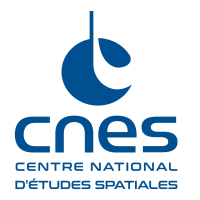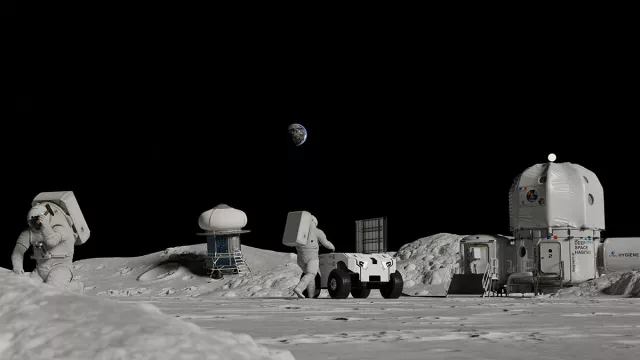Humans are readying to return to the Moon and establish permanent bases to enable astronauts to study our natural satellite in more detail than ever before and serve as a stepping stone to Mars. Numerous space agencies—CNES among them—are getting set for this new phase of space exploration. This activity is aligned with the 2018 release (supplemented in 2020) of the Global Exploration Roadmap (GER) of the International Space Exploration Coordination Group (ISECG). Spaceship FR is supporting this drive to define and meet the needs of future space bases.
Key information
| Mission | Lay the groundwork for robotic and crewed missions to the Moon and Mars |
|---|---|
| Domain | Science & technology |
| Start date | 2018 |
| Partners | ESA, research laboratories, commercial firms, higher education |
| Where | Toulouse Space Centre |
| Lifetime | Until an international base is established on Mars |
| Status | In operation |
Key figures
- 93 technological lines of investigation to develop human space exploration
- 7 technology pillars developed for project
- 78 partners involved in this CNES project
- 3 Spaceship development centres
Key milestones
- 2018: Spaceship FR created in Toulouse
- 2016: Spaceship ECSAT created in Harwell, UK
- 2012: Spaceship EAC (European Astronaut Centre) Created in Cologne, Germany
Project in brief
The Spaceship FR project aims to enable humans to extend their scope of action in space and, ultimately, to live there permanently. Reducing dependence on Earth and strengthening autonomy are just some of the challenges facing this endeavour. The main fields of investigation are applied sciences for health and for resources and knowledge needed to enable humans to survive in space for long periods.
As part of ESA’s exploration programmes, Terra Novae, ExPeRT (Exploration Preparation Research and Technology) and a series of Spaceship initiatives have been established in Germany, the United Kingdom and France. These agile innovation environments are intended to study new operational concepts and new technologies quickly and cost effectively, with support from expert space agency engineers, astronauts, an extended network of academics and research scientists, manufacturers (from start-ups to large primes) and general public actions. The aim is to get these stakeholders working together to incubate the best and brightest French firms of all sizes and achieve cross-fertilization between new areas for space like recycling, mining or robotics, for example.
CNES is focusing on the following areas:
- Crew habitats and radiation protection
- Long-term crew life support (air, water, food, etc.)
- Crew health and performance, through monitoring and maintaining fitness
- Robotics and automation to assist crew operations inside and outside the base
- Autonomy and in-situ resource utilization (ISRU), extraction and use of lunar regolith, etc.
- Energy (power generation and distribution, energy storage)
- Digital and supervision
Spaceship FR will combine all the expertise needed to design and build long-term habitats for human exploration of the solar system, bringing together the lay public, students, professionals, academia, schools and commercial firms. This partner network will serve to develop the feasibility of a future base on the Moon and possibly Mars.
Spaceship FR aims to be a precursor for a future lunar and/or Martian base by pulling together all technologies developed in France and Europe, and to anchor the international initiative nationally. It has already built a network of firms, research laboratories, engineering schools and universities around CNES.
Spaceship FR is already hosting workshops, student projects and post-doc and PhD work.
Ultimately, Spaceship FR will serve as a dedicated demonstrator for technology integration and feasibility studies, seeking to extend human exploration through seven technology pillars (see below).
Spaceship FR will be a showcase for visitors and a place to meet and discuss with new space entrants from industry, academia and start-ups sharing offices and laboratories for experimentation.
It will implement exemplary and innovative solutions to spur creativity and preserve the environment. The building will seek to achieve energy self-efficiency through the use of solar panels and water will be recovered and recycled.
This will be done by building bridges between stakeholders in these fields and through technology spin-off from space to Earth, and from Earth to space.

spaceship-axes-technologiques.png
- Habitat et protection
- Système support vie
- Santé
- Energie
- Automatisme et robotique
- Autonomie et ISRU
- Numérique et supervision
CNES’s role
Spaceship is a European project coordinated by ESA and initiated in 2012 with Spaceship EAC in Germany. Similar initiatives were subsequently set up in the United Kingdom and France. Spaceship FR is being led in France since 2018 by CNES, which is funding personnel and interns with ESA and contributing through the agency’s people. It is also receiving technical support from the MEDES space clinic in Toulouse.
The mission of Spaceship FR is to federate and support space stakeholders, whatever their level of involvement, to train future professionals in this sector and to conduct outreach about space exploration.
Contacts
Project Leader
Alexis Paillet
E-mail: alexis.paillet at cnes.fr
Head of Exploration Sciences
Jean Blouvac
E-mail: jean.blouvac at cnes.fr


